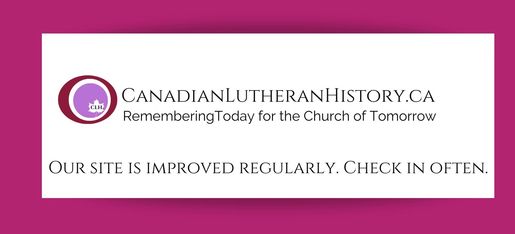Signed in as:
filler@godaddy.com
Signed in as:
filler@godaddy.com

In the geographic edges where oceans impact the settlement of lands, Lutherans explored from at least the 1600's.
Eylands, Lutherans in Canada
Cronmiller, A History of the Lutheran Church in Canada, 34-129. (on reserve)
For more on the BC Coast See:
For more on the Atlantic Coast See:
For more on the North Coast See:
by Bell, Winthrop Pickard, 1884-1965 https://archive.org/details/registerofforeig0000bell
Acadie and the Acadians 1890 by D. Luther Roth https://archive.org/details/acadieandacadia00rothgoog

Coming "up" from the United States and West from Europe, Lutherans - impacted by the geopolitics of other nations and colonial forces - established some of the first Protestant faith communities in the Indigenous lands of the "Peace and Friendship" and "post-Revolutionary War" settlement Treaty areas amid pressures for a "British North America".
Cronmiller, A History of the Lutheran Church in Canada, 34-129.

Lutherans immigrated into what became numbered Treaty Territories (Treaty 1 to Treaty 8) endeavoured to settle as pioneers in the emergeing antion of Canada.
Walter Freitag, Prospect and Promise of Lutheran Unity in Canada. Calgary: Foothills Lutheran Press, 1974. An exploration of the history, possibilities, and challenges of a potential three-way merger of Lutherans in Canada in the 1970s.

Matthew H. Diegel, “The New Evangelical Lutheran Church in Canada: The U.S. Connection?” Consensus, 13, No. 2 (1987), 35-50. Discusses the question of how “independent” the former LCA-CS members of the new ELCIC became from the LCA, based in the USA. GJ

Walter Freitag, The Ordination of Women: Challenge for Canadian Lutheran Unity. Saskatoon: Zip Printing, 1978. Originally intending to argue against the ordination of Women, Freitag ends up advocating for the ordination of women. Published after the LCA-CS and ELCC had accepted the ordination of women and men, this is helpful to get some insight into this issue that was one of the obstacles for a three way merger of Lutheran Churches in Canada in the 1970s. GJ

Norman J. Threinen, “ Pivotal Points in Early Canadian Church History, Consensus 13 No. 2 (1987), Article 3. A reflection upon three pivotal points in Canadian history; this establishment of the first Lutheran church in Canada in Halifax; confederation and the discussion of the formation of an indigenous Lutheran church in Canada; and the implications and challenges for the Lutheran Church during and after WW2 (especially for the German Lutherans in Canada). GJ

Walter Freitag, Prospect and Promise of Lutheran Unity in Canada. Calgary: Foothills Lutheran Press, 1974. An exploration of the history, possibilities, and challenges of a potential three-way merger of Lutherans in Canada in the 1970s. GJ.

Walter Freitag, "Fundamentalism and Canadian Lutheranism," Consensus, 13 No. 1 (1987), Article 3. One of the “elephants in the room” with regard to a possible three-way merger of the Lutheran churches in Canada was the influence fundamentalism had on Lutherans, especially with regard to question of inerrancy of Scripture. Freitag explores the often not acknowledged relationship between fundamentalism and Lutheran pietism in the Canadian context.. GJ

Richard C. Wolf, Documents of Lutheran Unity in America, Philadelphia: Fortress Press, 1966. Wolf provides an excellent collection of documents that have shaped the life of the Lutheran Church in North America. While primarily focussed on the USA, the included documentation of decisions, minutes, and developments of church constitutions very often had great implications for the Canadian Lutheran churches. GJ

Norman J. Threinen, “ A Religious-Cultural Mosaic: A History of Lutherans in Canada. Vulcan: Today’s Reformation Press, 2006. This is probably the best current text on the history of the Lutheran churches in Canada. It covers not just the development of Lutheran church bodies in Canada (with more detail on German Lutherans in Canada), but it also describes the development of various inter-Lutheran agencies, including the Lutheran Immigration Board, Canadian Lutheran World Relief, the Lutheran Council in Canada, Lutheran seminaries in Canada, some ecumenical engagements, and merger attempts and successes. While acknowledging social challenges facing the Lutheran churches, it pointedly avoids taking positions. Due to its date of publishing, the many significant decisions made by the ELCIC since then are not covered, however.. GJ

Gordon A. Jensen. “The Theology of William Hordern: Living by Grace.” Consensus, 36 No. 1 (2015), Article 6. This article provides an overview of a pre-eminent Canadian Lutheran theologian, Bill Hordern. The first president of the merged Lutheran Seminaries in Saskatoon, he was also on the merger commission leading to the formation of the ELCIC. His theological approach has shaped many pastors in the ELCIC. GJ

Norman J. Threinen, “ Toward Union: Lutheran Merger Negotiations in Canada, 1972-1978. Winnipeg: Lutheran Council in Canada, 1979. As the title suggests, this book documents the three-way merger attempt among the LCA-CS, ELCC, and Lutheran Church-Missouri Synod Lutherans in Canada. The appendices also contain helpful documents and reflections on the main issue that scuttled the negotiations, the authority of scripture, and the ordination of women as a case study on the authority of scripture. GJ

Copyright © Remembering Today For The Church Of Tomorrow Project (Canadian Lutheran History).This site is developed with the presumption of grace. It relies on the documents of many sources and the opinions of many individuals.. Should you have concerns about any of our content please contact us.

!
This is a living archive. We count on viewers to become contributors - making the site better.